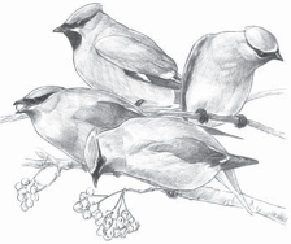Biology Reference
In-Depth Information
These cavities are, for many species, a
limiting factor.
When House Sparrows colonize
anarea,theyaggressivelyevictnativespeciesfromthesenestsites,oftendestroyingeggs
and killing chicks and adults. Widespread colonization of House Sparrows is one of the
factors that contributed to the decline of Purple Martins.
It'shardtopredictwhichspecieswillbecomeinvasiveinanewplace,andevenharder
tocontrolaninvasivespeciesonceit'sreleased.Preventingintroductionsinthefirstplace
is vital for preserving biodiversity.
Q Robins and Cedar Waxwings are always visiting my buckthorn trees. My mother-
in-law says buckthorn is an “invasive exotic” and that I should get rid of it. How can
it be bad if the birds love it?
A
Common or purging buckthorn is indeed an invasive exotic in America. It was intro-
ducedherepartlyasagardenshrubandpartlybecause ofitspurgative properties inherb-
almedicine.It'saninvasivepest,crowdingoutothershrubsandservingasaprimaryhost
of the soybean aphid.
Birds do gorge on the berries, and then fly off to poop out the seeds in other places.
This seems like a good deal for the birds, but buckthorn may not be very good for them
and is definitely not good for the environment. Because buckthorn crowds out native
shrubs, it reduces the amount of food available to birds in times of the year when it isn't
fruiting.
So, yes, if common buckthorn is growing in your yard, it's a good idea to cut it down.
Itgrowsbackquickly,somanyauthoritiesrecommendthatafteryoucutitdownyoutreat
the stump with an herbicide. If you do this, be careful to limit the application to only the
buckthorn. Replace buckthorn with fruiting trees and shrubs native to your area. You can
find out good varieties to choose from local conservation and gardening clubs or your
state department of natural resources or environmental conservation.



